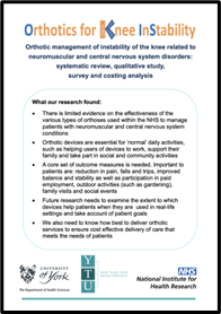Orthotic management of instability of the knee in neuromuscular disease (OKIS)
This study investigated the cost, effectiveness, and user experiences of orthotics worn as a result of the instability of the knee in neuromuscular and central nervous system conditions. There is little evidence for cost or effectiveness and future research should focus on outcomes that address user concerns.
Why did we do this research?
People with neuromuscular and central nervous system conditions can experience knee instability, which may be treated using callipers or splints, known as ‘orthotic devices’. Very little is known about the effectiveness of these devices, how often they are used, how much they cost the UK NHS or what patients think about them. This study aimed to investigate these knowledge gaps.
What did we do?
We systematically searched for existing research and examined it to find out what is already known about the effectiveness of these orthotic devices. Healthcare professionals were asked to take part in a survey and interviews to identify the types of devices currently being provided by the NHS, how often they are used, their cost and professionals’ views about the use of devices. Patients using devices were invited to talk to a researcher in a face-to-face interview about their views and experiences.
Who was involved?
For the survey, we engaged with healthcare professionals involved in providing orthotic devices for knee instability through three professional organisations, (ACPIN , BAPO and BSPRM). Patients using devices who took part in the interviews were identified through clinical members of the research team, and through invitations sent to representatives of the British Polio Fellowship, Charcot–Marie–Tooth UK, the FSH (facioscapulohumeral muscular dystrophy) Support Group UK and the Muscular Dystrophy Campaign.
What did we find?
Our findings suggest that a number of different devices are provided in the NHS. However, we cannot tell from existing literature how effective they are, as very few studies examined the extent to which the devices helped patients when they were used in real-life settings. In the interviews, patients highlighted how important their device can be in helping them to work, support their family and take part in social and community activities. However, they were unhappy about some aspects of their treatment. We also found that treatment outcomes considered important by patients are not being routinely measured.
What have we learned?
Various types of orthoses are used in the NHS to manage patients with neuromuscular or central nervous system conditions and knee instability, both custom-made and prefabricated, of variable cost. There is limited evidence on the effectiveness of the orthoses, especially in relation to the outcomes that are important to people who use them.
Future work should include high-quality research on the effectiveness and cost-effectiveness of orthoses; development of a core set of outcome measures taking account of orthotic users concerns; further exploration of the views and experiences of patients; and the best models of service delivery.
Outputs
The full NIHR HTA report can be accessed here:
O'Connor J, McCaughan D, McDaid C, Booth A, Fayter D, Rodriguez-Lopez R, et al. Orthotic management of instability of the knee related to neuromuscular and central nervous system disorders: systematic review, qualitative study, survey and costing analysis.Health Technol Assess 2016;20(55) http://www.journalslibrary.nihr.ac.uk/hta/volume-20/issue-55#table-of-contents

Orthotics for Knee Instability Blog: https://kneeorthotics.blogspot.com/
Team
- Catriona McDaid (Chief Investigator)
- Dorothy McCaughan
- Alison Booth
- Lisa Dyson
- Cynthia Iglesias
Department of Health Sciences, University of York, York, UK
- Debra Fayter
- Roccio Rodriguez-Lopez
Centre for Reviews and Dissemination, University of York, York, UK
- Roy Bowers
Biomedical Engineering, University of Strathclyde, Glasgow, UK
- Simon Lalor
Queen Mary’s Hospital, St George’s University Hospitals NHS Foundation Trust, London, UK
- Rory J O’Connor
Leeds Institute of Rheumatic and Musculoskeletal Medicine, University of Leeds, Leeds, UK
- Margaret Phillips
Royal Derby Hospital, Derby, UK
- Gita Ramdharry
Kingston University and St George’s University of London, London, UK
- Joanne O’Connor
Institute of Health and Society, Newcastle University, Newcastle upon Tyne, UK
Funding
The research was commissioned by NIHR HTA programme (Award ID: 13/30/02) and a grant of £168,809.73 awarded. The project was started in April 2014 and completed in July 2015.
Study registration
The systematic review was registered on PROSPERO:
Debra Fayter, Joanne O'Connor, Alison Booth, Catriona McDaid, Rocio Rodriguez-Lopez. Orthotic management of instability of the knee in neuromuscular disease and central nervous system disorders. PROSPERO 2014 CRD42014010180 Available from: https://www.crd.york.ac.uk/prospero/display_record.php?ID=CRD42014010180
The qualitative study was registered on the ISRCTN register:
ISRCTN65240228 https://doi.org/10.1186/ISRCTN65240228
Orthotics for knee instability (OKIS)

